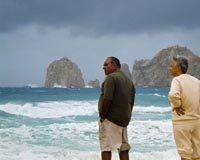| . |  |
. |
Washington (AFP) Sept 2, 2009 With three months left in the 2009 Atlantic hurricane season, storm watchers can be sure that there will not be another Hurricane Katrina, or Rita, or Wilma this year, or ever again. The names of these devastating hurricanes and other destructive storms have been "retired," never to reemerge, so that new monikers can be assigned to the weather systems that develop each hurricane season. The task of striking and replacing names falls to the World Meteorological Organization's Hurricane Committee, which devotes part of its annual meeting to the process of voting to remove names and devising new ones. Assigning names to tropical depressions, storms and hurricanes has been common practice for hundreds of years, in part because it made it easier for coastal stations and ships to identify and transmit information about weather systems. In the 1800s, storms that developed in the West Indies were commonly named after the saint's day on which they occurred, such as the ferocious Hurricane Santa Ana, which killed hundreds when it hit Puerto Rico in 1825. The practice of naming storms was popularized by meteorologist Clement Wragge in the 19th century and formally adopted by the Miami-based National Hurricane Center in 1953, when six lists of female names were compiled -- each containing one name for all but five letters in the alphabet. "There's five letters that we do not have in there -- q is one of them, and then u, x, y, z. And the reason for that is there are not enough names... that we'd be able to put them in the list and have enough to replace them," said National Weather Service spokesman Dennis Feltgen. In 1978, meteorologists began to assign men's names to storms forming in the Eastern North Pacific and the practice widened the following year to include Atlantic and Gulf of Mexico weather systems. The six lists are used in rotation, so the names that survive from this year's hurricane list will next be up for usage again in 2015. Only once since reliable records began in 1944 has an Atlantic storm season produced more storms than names on a list and forced the use of a backup option -- the Greek alphabet. The 2005 season, which included the devastating Hurricane Katrina, produced a record 27 named storms, ending with Delta, Epsilon and Zeta. Unsurprisingly, a record five names -- Dennis, Katrina, Rita, Stan and Wilma -- were retired that year. In all, more than 70 names have been retired for the Atlantic Ocean, Caribbean Sea and the Gulf of Mexico region, Feltgen said, and the process of devising new names is usually a low key process that attracts little attention. But in 2001, the Hurricane Committee found it had created an uproar by adding, among others, the names "Israel" and "Adolph" to the Eastern North Pacific storm list. Jewish leaders expressed outrage at the decision, and though officials noted that Israel and Adolph, spelled with a "ph" unlike Adolf Hitler, were common boy's names, they retired the names at the end of the season. Share This Article With Planet Earth
Related Links Bringing Order To A World Of Disasters When the Earth Quakes A world of storm and tempest
 Tourists flee Hurricane Jimena in Mexico
Tourists flee Hurricane Jimena in MexicoPuerto San Carlos, Mexico (AFP) Sept 1, 2009 Hurricane Jimena sent tourists fleeing Tuesday as it bore down on Mexico's Baja California, while fishing communities on the sparsely populated peninsula toughed it out. The peninsula, which spears down from California into northwestern Mexico, lay directly in the path of 2009's mightiest hurricane, but few residents evacuated even as tourists scattered from resorts on its southern tip. ... read more |
|
| The content herein, unless otherwise known to be public domain, are Copyright 1995-2009 - SpaceDaily. AFP and UPI Wire Stories are copyright Agence France-Presse and United Press International. ESA Portal Reports are copyright European Space Agency. All NASA sourced material is public domain. Additional copyrights may apply in whole or part to other bona fide parties. Advertising does not imply endorsement,agreement or approval of any opinions, statements or information provided by SpaceDaily on any Web page published or hosted by SpaceDaily. Privacy Statement |